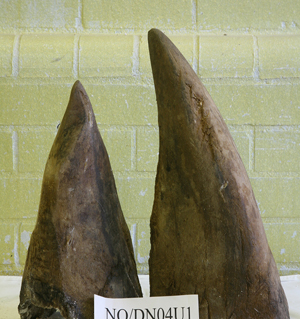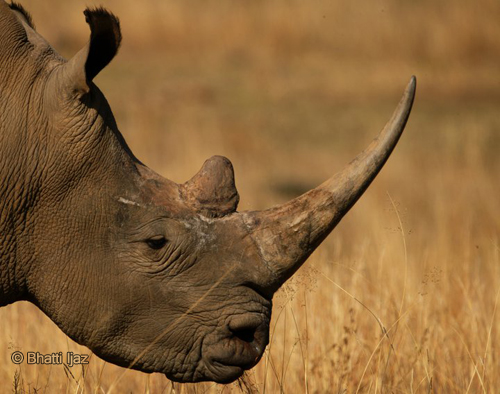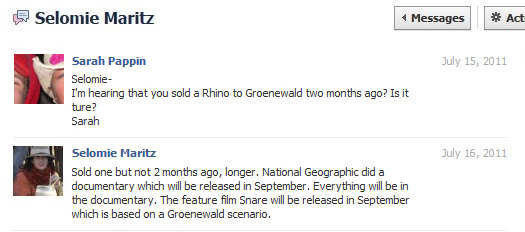A Naboomspruit woman admits to selling a rhino to the notorious Dawie Groenewald, suspected leader of an organized crime syndicate accused of poaching dozens of rhinos in South Africa.
Selomie Maritz gained national and international attention in 2010 when she made a strong appeal for help to save a de-horned, critically endangered black rhino cow, named ‘Phila’, that had survived two vicious attacks from poachers. The Naboomspruit woman has been one of the loudest voices in the rhino front. However, it seems there is something many of us did not know—until now. Maritz has openly admitted to recently selling a male rhino to the internationally-despised Dawie Groenewald, who—along with twelve others—is standing trial for charges related to a commercialized rhino-poaching operation based in South Africa’s Limpopo province.
The matter was first brought to our attention over the past week, but we wanted to give Maritz a chance to confirm or deny the claims. Through online correspondence, she told a Bush Warriors team member that, indeed, she had sold a rhino to Groenewald. We later received further confirmation of the claim from inside sources, in which Maritz outlines her reasoning for making the controversial transaction at some point this year.
**See note below article
The Ubumanzi Lodge owner told inside sources that she sold the rhino to Groenewald as part of a plan to get herself and a film crew onto the suspected criminal’s property, for the purposes of obtaining footage of him working with alleged accomplice, Dr. Karel Toet. Maritz says a documentary that contains this footage is expected to be released sometime before Groenewald’s long-awaited return to the Musina Magistrate Courthouse in September.
Conservationists on the frontline to save these imperiled animals are shocked, disappointed, and appalled to learn about the incident. One might say that her actions have made a mockery of the ongoing, intense efforts made to protect South Africa’s rhinos and deals yet another devastating blow to the conservation community. Additionally, it seems extremely questionable as to whether potentially sacrificing the life of one of these pachyderms is ever worth any footage or inside information that could possibly be obtained from such a move.
 Given the current status of Groenewald’s court case, which the prosecution continues to investigate, one might conclude that he would avoid any incriminating behaviors if being filmed and/or watched by members of the public. It seems that this would, in effect, provide nothing to gain for anyone except the people directly benefiting from this “business transaction”—Maritz and Groenewald.
Given the current status of Groenewald’s court case, which the prosecution continues to investigate, one might conclude that he would avoid any incriminating behaviors if being filmed and/or watched by members of the public. It seems that this would, in effect, provide nothing to gain for anyone except the people directly benefiting from this “business transaction”—Maritz and Groenewald.
The Ward-Groenewald-Maritz Rhino Connection
According to reports, game farmer, Dr. Walter Ward—who claims he is a passionate protector of his wildlife—made an agreement to sell nine rhinos to Out of Africa Adventurous Safaris owner, Dawie Groenewald, despite purportedly being aware of the criminal allegations laid against him. It was recently exposed that, in spite of his pending court case, Groenewald continues to be issued permits to hunt, import, and “convey” rhinos. Thus, if the proper permits had been obtained, Ward and Groenewald’s exchange would have been legal.
At least two of the doctor’s rhinos fell victim to violent poachers only months ago. Sources claim Ward has been paying Maritz to keep his nine remaining rhinos on her property—which she has referred to as a rhino sanctuary—since the tragic incident that claimed the lives of a cow and her calf.
The deal with Groenewald seems to have dissolved, while the very idea of it was hit by a clout of heated responses from the public. Instead, reports indicate Ward chose to sell his rhinos to Mauricedale Game Ranch owner, John Hume, who—according to Maritz—claims he will not allow the animals to be hunted nor exported.
However, Hume has come under much scrutiny from a wide range of conservationists, as he publicly advocates legalizing the rhino horn trade, while also owning one of South Africa’s largest private collections of rhinos. The man also works closely with professional hunter, Peter Thormahlen, who has been charged with rhino-related crimes, not just once, but twice. The hunter was found guilty of and fined for these charges in 2006, but escaped conviction when his second case was dismissed by the court in 2008.
Additionally, it seems Hume and Groenewald may have conducted business with each other in the past, when the two possibly exchanged rhinos in years prior to the suspect’s September 2010 arrest.
South Africa’s Rhinos in Crisis
 Since the start of the year, at least 218 rhinos have been massacred by poachers in South Africa alone. The nation lost a minimum of 333 of these animals in 2010. At least 123 arrests have been made so far this year, which have resulted in only six successful convictions. This reflects a conviction rate of only 4.9% — just slightly better than 2010’s deplorable 2.4%, which stemmed from a mere four convictions out of a reported 165 arrests.
Since the start of the year, at least 218 rhinos have been massacred by poachers in South Africa alone. The nation lost a minimum of 333 of these animals in 2010. At least 123 arrests have been made so far this year, which have resulted in only six successful convictions. This reflects a conviction rate of only 4.9% — just slightly better than 2010’s deplorable 2.4%, which stemmed from a mere four convictions out of a reported 165 arrests.
The slaughter is largely being conducted by well-connected, organized crime syndicates who use high-tech equipment, veterinary drugs, and helicopters to kill the animals for their horns. Additionally, these crime rings are known to exploit poverty-stricken communities to carry out their dirty work on private game farms and in national parks.
 Demand for rhino horn stems almost exclusively from East and Southeast Asia, particularly from China and Vietnam. There, it is used to make traditional medicines, which are superstitiously used to treat a variety of ailments from fevers to boils, impaired liver function, and even devil possession. Contrary to a common misconception, one of the few things rhino horn is not used for is libido. Recently, traditional medicine practitioners have even falsely claimed that rhino horn is capable of curing cancer. Scientific studies have effectively shown rhino horn to be wholly void of any curative, medicinal properties.
Demand for rhino horn stems almost exclusively from East and Southeast Asia, particularly from China and Vietnam. There, it is used to make traditional medicines, which are superstitiously used to treat a variety of ailments from fevers to boils, impaired liver function, and even devil possession. Contrary to a common misconception, one of the few things rhino horn is not used for is libido. Recently, traditional medicine practitioners have even falsely claimed that rhino horn is capable of curing cancer. Scientific studies have effectively shown rhino horn to be wholly void of any curative, medicinal properties.
The trophy hunting industry has increasingly been identified as a major contributor to this ongoing crisis. Foreign hunters — mainly from Vietnam and most recently from Thailand — have repeatedly been implicated in the abuse of rhino hunting opportunities in attempts to obtain the horns from the trophies to supply the black market. Additionally, unscrupulous insiders from the game farming and trophy hunting communities have also been exposed on numerous accounts for their role in the illicit trade, as has been the case with the ‘Groenewald Gang’, for just one example.
Why are so many members of South Africa’s conservation community turning their backs on these animals? How can conservationists make headway in this war on rhinos, when it’s becoming increasingly unclear who is actually on their side? Is it appropriate to question how someone who seemed to have fought so hard for one rhino‘s rights could so quickly forgo those of another? How do you feel about the potential sacrifice of one rhino’s life, for the reasons that Maritz uses to justify her actions? Were the animal’s best interests truly kept in mind? Tell us what you think.
Article duplicated from “Self-Proclaimed Rhino Conservationist Admits to Selling Rhino to Alleged Poaching Syndicate Mastermind” by Sarah Pappin, originally published 17 July, 2011 on BushWarriors.org
Image #1 ©Bhatti Ijaz
Image #3 ©Sarah Pappin
Image #4 ©Protrack Anti-Poaching Unit
Image #5 via ukhomeoffice on Flickr
**An unaltered version of the above screenshot (i.e. without blurred face and name):






14 Responses to “Self-Proclaimed Rhino Conservationist Admits to Selling Rhino to Alleged Poaching Syndicate Mastermind”